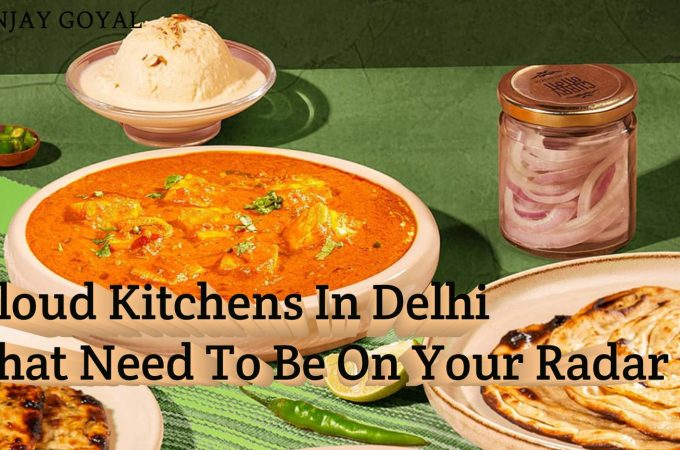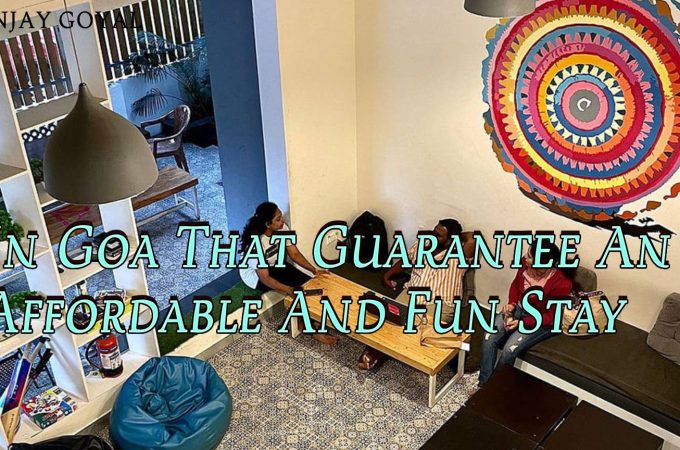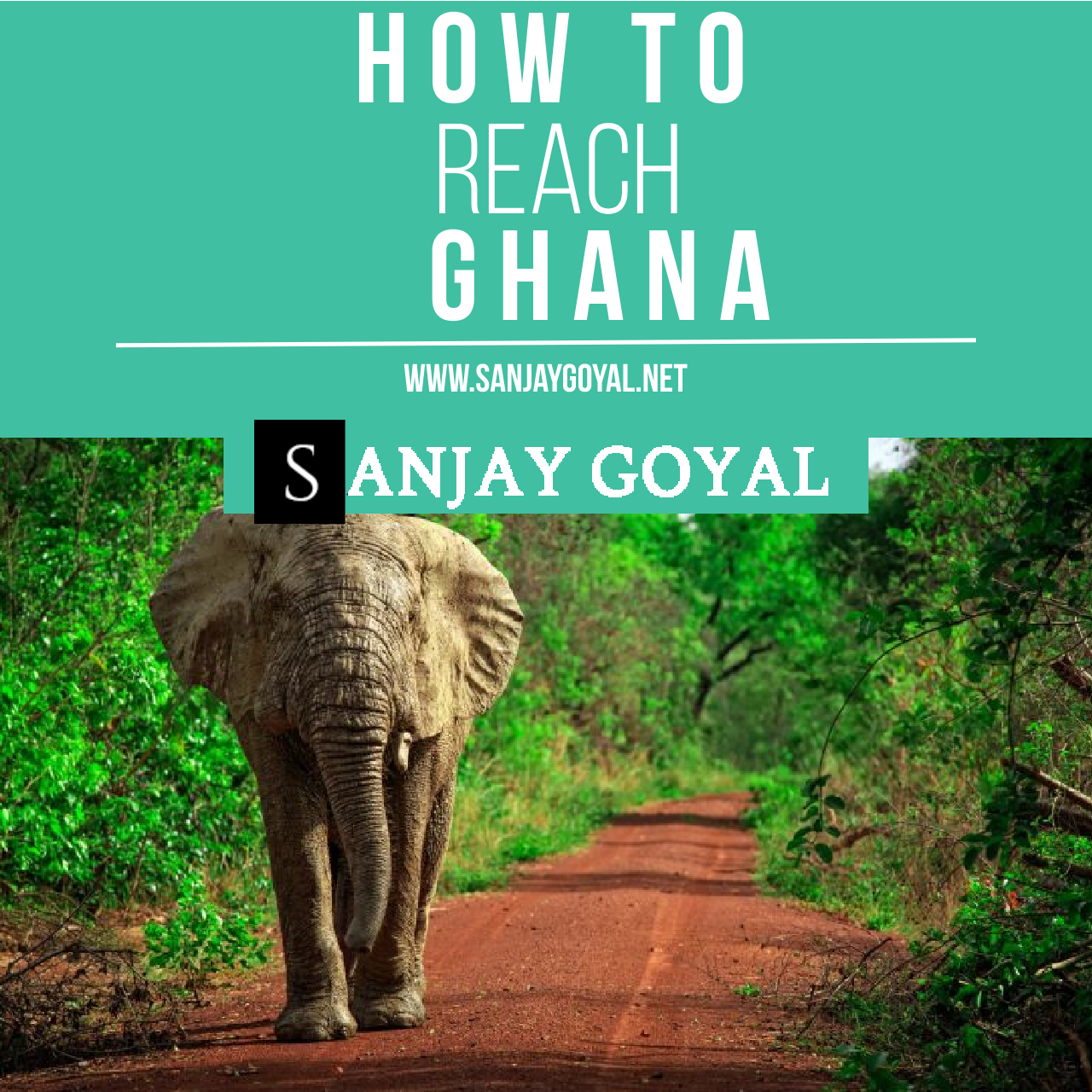
-
Save
HOW TO REACH GHANA
You can get into the country by plane, bus, boat and car. You can take a bus to Tamale to get into the country by coming through the different water fronts and it is one of the cheapest ways to get around and into Ghana. There are plenty of different places that you can cross the border from when you are driving.
Our Ghana travel tips and checklist will prepare you for your West Africa adventure. Are you ready?
Key Takeaways
- Ghana is a popular Rustic Pathways destination for 2024 and we expect the same in 2025.
- Travel safe! Travelers should drink bottled water, use mosquito repellents, take anti-malarial tablets, and carry their Yellow Fever vaccination certificate.
- Ghanaians are friendly, but be respectful and friendly, and be prepared for stares as a foreigner. A solo trip or DIY trip to Ghana is possible or you can book your travel to Ghana with Rustic Pathways.
Travel Tips:
Health Tips:
- Only drink bottled water; avoid sachet water. We really like Belquia and Voltic.
- Use mosquito repellent, coils, and nets to avoid mosquito bites.
- Bring and take anti-malarial tablets.
- Use sunscreen to protect against sunburn.
- Seek immediate treatment if you suspect you have malaria.
- Bring charcoal tablets and Imodium for digestive issues. Unless you’re coming from Ivory Coast, you’re probably not used to it.
Safety Tips:
- Avoid engaging with unsolicited sellers at tourist sites. Don’t get manipulated by vendors with sob stories. They do it every day.
- Avoid walking alone after dark in big cities.
- Travel with a local guide for easier navigation and safety.
- Be polite but firm in any arguments or conflicts.
- Avoid carrying drugs due to random police checks.
- Be aware of trash in public areas, especially in the city.
>>View Ghana Tours 2024. See new itineraries and special packages.<<
Cultural Tips:
- Learn a few local phrases (e.g., “Akwaba” means welcome).
- Be respectful and friendly; locals are hospitable.
- Greet people respectfully and know some local phrases like “madasi” (thank you).
- Be prepared for stares as a foreigner; locals can tell you’re not from Ghana.
Travel Tips:
- Use Bolt and Uber for transportation.
- Be on the lookout when walking, drivers can be unpredictable.
- Don’t start with street food immediately; let your body adjust.
- Use the Cityloop app for event information.
- Avoid going out too far at night due to poor lighting.
- Traffic can be a total mess; be cautious when crossing roads.
- Expect to be charged extra as a foreigner.
- Stick to tourist-friendly places for the first few days until you get the hang of Ghana.
- Having a local friend helps with navigation and haggling. Rustic Pathways can be your local friend
- Research your options as prices are higher in December.
- Stay hydrated and be ready for the heat.
Accommodation Tips:
- Choose secure hotels on sites like hotels.com or booking.com or choose apartments in compounds.
- AirBnBs can range widely. Some suck and others are awesome. Read reviews carefully.
- Partner with Rustic Pathways for budget friendly accommodations in safe areas.
Money Tips:
- Credit card payments aren’t widely accepted, and credit card fraud is a problem. Use cash.
- ATMs are available; Echo Bank and GCB do not charge transaction fees.
- Withdraw money using foreign cards to avoid high exchange fees.
- Ghanaian cedi is the local currency.
Connectivity Tips:
- MTN provides the best mobile network coverage. Consider getting an international data plan.
- Wi-Fi is not widely available outside cities, so identify places with good Wi-Fi for work, such as lobbies of fancy hotels.
- Use WhatsApp for communication and know the country code (+233 for Ghana).
Shopping Tips:
- Bargain by starting at half the quoted price, especially in markets.
- Familiarize yourself with landmarks and local navigation, as GPS might not always be reliable.
- Remember the name of your area. Many taxi driver go by feel so knowing where you were and where you are going is important.
Travel Checklist:
Before You Go:
- Apply for a visa unless you’re from an African Union country or you have a Ghanaian passport or Ghana card.
- Get a Yellow Fever vaccination certificate.
- Bring mosquito repellent, mosquito coils, and nets.
- Pack anti-malarial tablets.
- Carry sunscreen.
- Plan your visit for September or October to avoid extreme heat.
- Research transportation options and download Bolt or Uber apps.
- Book accommodations through trusted sites or partners.
- Arrange for local currency or be prepared to use ATMs.
Packing List:
- Passport and visa
- Yellow Fever vaccination certificate
- Mosquito repellent, coils, and nets
- Anti-malarial tablets
- Sunscreen
- Charcoal tablets and Imodium
- Comfortable clothing for hot and dry weather
- Cash in Ghanaian cedi
- UK-style plug adapters (type D and G, 230 Volts)
- Smartphone with international data plan or local SIM card (MTN recommended)
On Arrival:
- Only drink bottled water!
- Get local currency from ATMs (Echo Bank and GCB recommended).
- Arrange transportation using Bolt or Uber.
- Avoid street food initially to let your body adjust.
- Use the Cityloop app for event information.
- Stay cautious and aware of your surroundings.
While in Ghana:
- Follow safety precautions, especially at night and in crowded areas.
- Be respectful and learn local phrases.
- Use a local guide for market visits and navigating unfamiliar areas.
- Stay hydrated and apply sunscreen regularly.
Visa Requirements
Travel to Ghana without visa is possible for African Union (AU) citizens. Citizens from AU countries can apply for a visa on arrival. Everyone else needs to apply for a visa in advance of their trip.
Ghana does not offer working holiday visas, but the country does allow visitors to extend a tourist visa once you’re in Ghana. All non Ghanaian residents must have a passport to enter. Fun fact: In 2020, the Ghanaian passport was ranked 78th strongest as it only allows visa free or visa-on-arrival access to few countries.
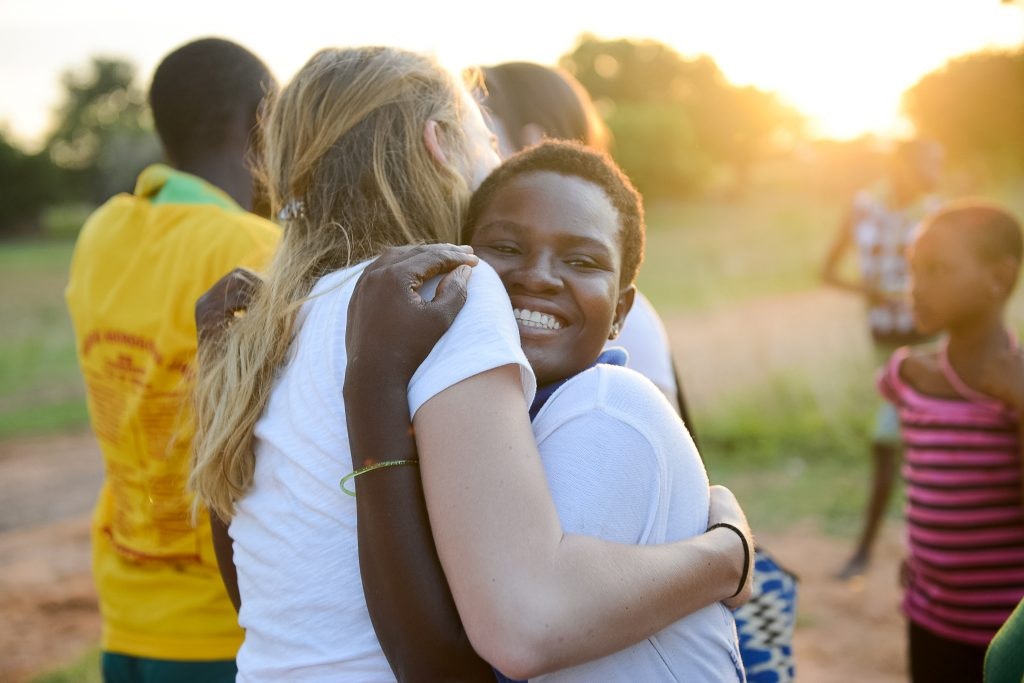
-
Save
Where is Ghana on the Map?
Neighboring Nations
Ghana is on the African continent in West Africa. Cote d’Ivoire Ivory Coast is to the west, Burkina Faso on the northern border, Togo to the east and the Gulf of Guinea is to the South.
The Regions of Ghana
Ghana is divided into 16 administrative regions, which are themselves divided into local authorities. The Greater Accra Region is the smallest by area but has the highest population density. Accra is the capital of the country and the most populous city.
| Region | Capital |
| Ashanti | Kumasi |
| Bono | Sunyani |
| Bono East | Techiman |
| Ahafo | Goaso |
| Central | Cape Coast |
| Eastern | Koforidua |
| Greater Accra | Accra |
| Northern | Tamale |
| Savannah | Damongo |
| North East | Nalerigu |
| Upper East | Bolgatanga |
| Upper West | Wa |
| Volta | Ho |
| Oti | Dambai |
| Western | Takoradi |
| Western North | Wiawso |
Major Cities and Capitals
Major cities in Ghana besides the capital include Kumasi in the Ashanti region, Sunyani in the Bono region, Cape Coast in the Central region, Koforidua in the Eastern region, Tamale in Northern Ghana, Bolgatanga in the Upper East region and Wa in the Upper West region.
| Rank | Name | Region | Population |
| 1 | Accra | Greater Accra | 1,964,264 |
| 2 | Kumasi | Ashanti Region | 1,468,609 |
| 3 | Tamale | Northern Region | 360,579 |
| 4 | Takoradi | Western Region | 232,919 |
| 5 | Sunyani | Bono Region | 202,932 |
| 6 | Teshie | Greater Accra | 176,597 |
| 7 | Cape Coast | Central Region | 143,015 |
| 8 | Sekondi-Takoradi | Central Region | 138,872 |
| 9 | Obuasi | Ashanti Region | 137,856 |
| 10 | Koforidua | Eastern Region | 130,810 |
Landscape Features
Ghana’s landscape includes coastal plains, the Volta River, the main river system in the country, dense tropical forests, the Togo-Atakora Mountains along the eastern border, expansive savannas in the north, and Lake Volta, the world’s largest man-made lake. National parks, such as Mole National Park and Kakum National Park, preserve rich and diverse natural ecosystems and are big Ghana tourist attractions.
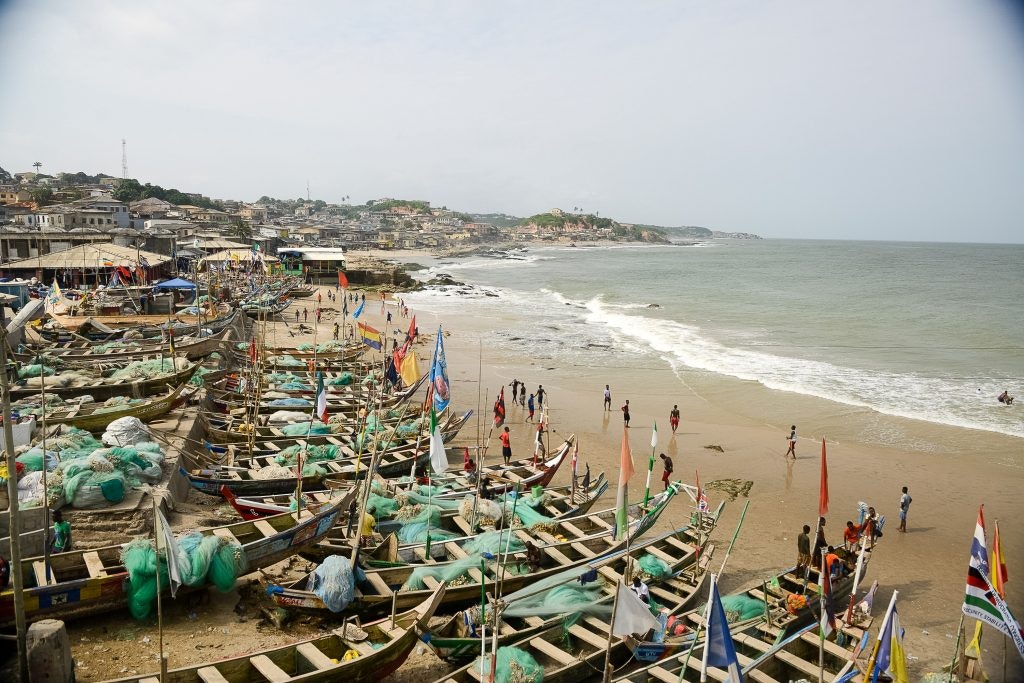
-
Save
www.rusticpathways.com
Credit: Rustic Pathways
Copyright: © 2016 Rustic Pathways
Usage with express permission only.
Upper East and Upper West
The Upper East region, in the north east part of the country and Upper West regions, located in the north west part of the country, are particularly distinctive. These upper east regions, along with the upper west regions, were formed in 1983 when the Upper Region was divided, creating two unique administrative areas with Bolgatanga and Wa as their respective capitals.
The Upper West Region is bordered by Burkina Faso to the west and north and is known for its agricultural economy.
>>View Ghana travel packages<<
Tourism in Ghana
Ghana tours 2024 are available from Rustic Pathways, starting from Accra. Our Ghana trip packages offer an all inclusive trip to Ghana with no planning needed on your part.
As an experienced tour operator, our local knowledge can make sure you get everything out of your Ghana tour. For further details, contact us. Also check our Ghana travel blog for firsthand experiences and tips on all things Ghana tourism.
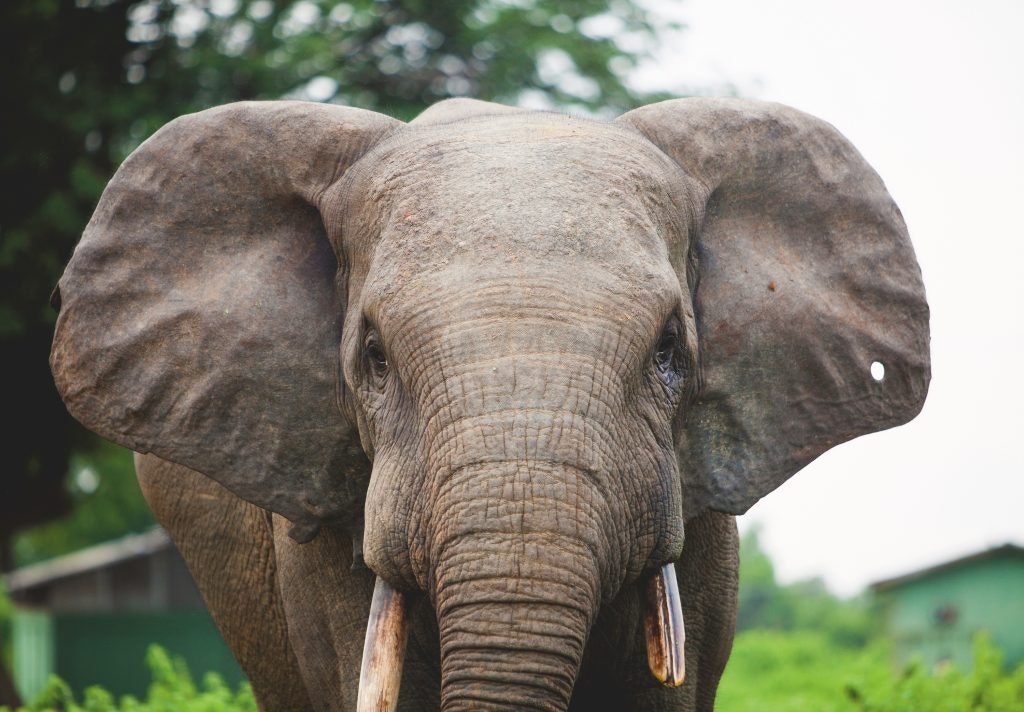
-
Save
Key tourist attractions outside Accra on Ghana tour packages in the Upper East regions include the Paga Crocodile Pond, the historic mud-built Navrongo Cathedral, and the vibrant Bolgatanga Market, known for its Bolga Baskets.
Additionally, the Tongo Hills and Tenzug Shrines offer visitors a glimpse into the region’s traditional worship practices and striking natural rock formations.
In the Upper West, our Ghana travel itinerary includes the Wechiau Hippo Sanctuary, the primary habitat for hippos in the country with canoe rides and opportunities to see chameleons, monitor lizards, and over 200 bird species. The Gbelle Game Reserve protects endangered animals like hippos and waterbucks.
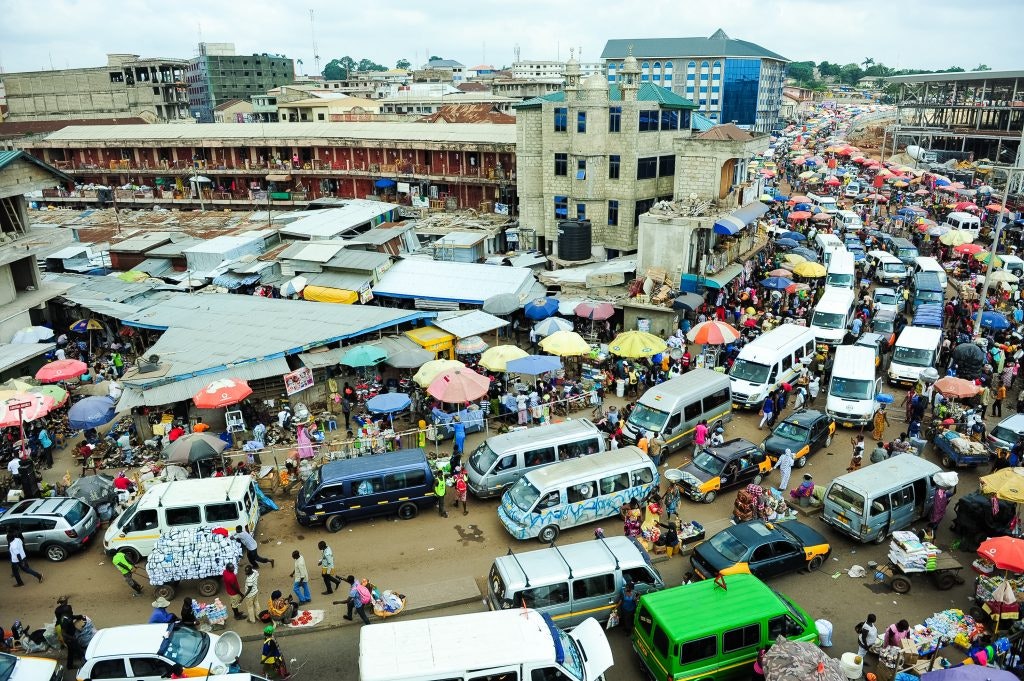
-
Save
Copyright: © 2016 Rustic Pathways
Safety and Security While Traveling
Ghana is generally safe for travelers, but there are security concerns including politically motivated violence, petty theft, increased risk of crime during power outages, and some risks for women traveling alone, particularly near northern border regions.
Travelers should use registered taxis, stay alert in crowded places, and be cautious with credit card details to prevent unauthorized transactions. In an emergency, dial 112 for assistance.
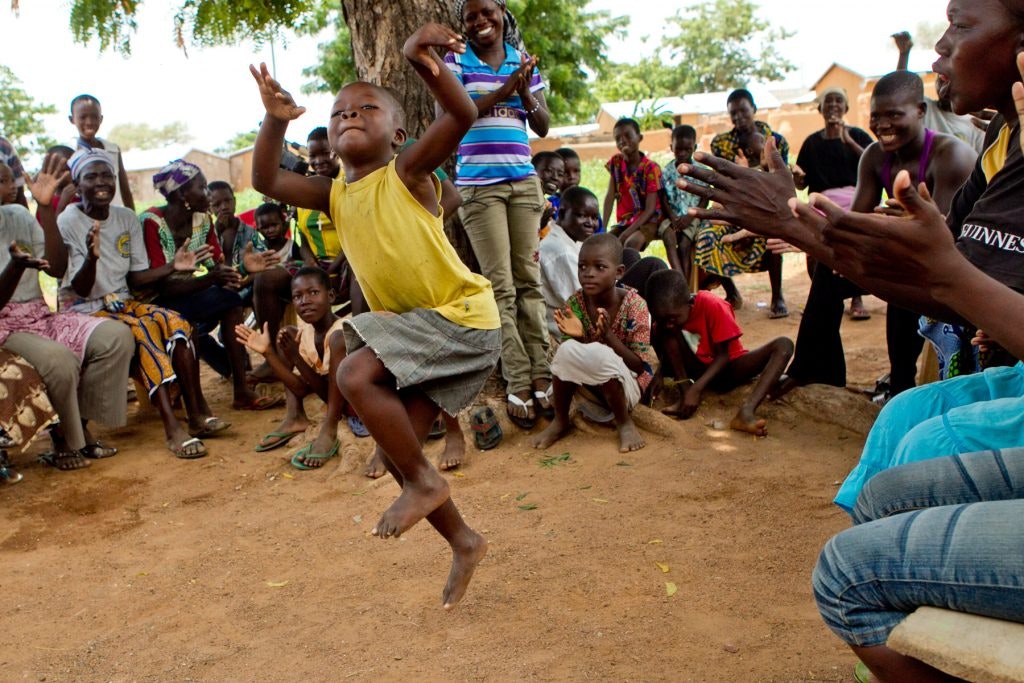
-
Save
Health Care and Medical Care
For disease control, the government required proof of Yellow Fever vaccination as an entry requirement. Consult with your doctor for other recommended immunizations, including Hepatitis A, Malaria, Meningitis, and Typhoid.
Healthcare in urban areas is basic, and medical facilities are more limited in rural areas. You may need upfront cash payments for treatment. In case of a medical emergency, dial 193 to reach emergency services.
Emergency Contacts
American citizens in Ghana with an emergency can contact the U.S. Ghana Embassy. You can reach the Embassy Duty Officer at +233 (0) 30-274-1000. They are available to assist you with any urgent matters. This number is available for both business hours and after-hours emergencies.
Please note that this phone number is not for visa inquiries. For visa-related concerns, it’s best to contact the appropriate department or visit the U.S. Embassy’s official website.
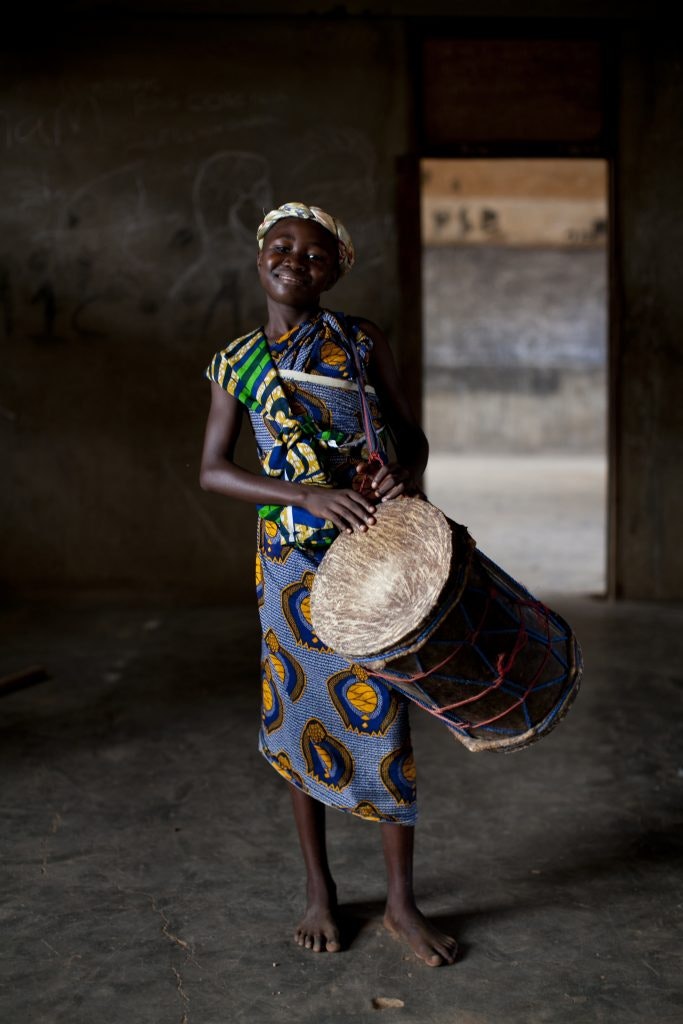
-
Save
Navigating Local Laws On The African Continent
While in Ghana, it’s recommended to follow local customs and practices. Understanding and adhering to local laws can help you avoid legal issues. Key points to remember include:
- Carry Identification: Always carry a copy of your passport and visa.
- Alcohol: Drink only in licensed establishments.
- Public Protests: Avoid involvement in local political affairs.
- Littering: Dispose of trash properly.
- Driving: Use an international driving permit and always wear seat belts.
- Police Checks: Be prepared for routine checks from Ghana police service.
Understanding Local Governance
Governance in Ghana extends beyond national politics, reaching into local affairs. Since 1992, the country has had peaceful transitions of power between two dominant political parties, the National Democratic Congress and the New Patriotic Party, illustrating a strong democratic culture.
The Electoral Commission of Ghana plays a crucial role in managing the electoral process. However, it’s not without its challenges and criticisms. Despite these, Ghana continues to strive for transparency and accountability in its political landscape, making it a model for many other African nations.
Ghana’s International Role
Ghana is a member of the African Union, United Nations, International Monetary Fund, World Bank, and World Trade Organization. It also holds observer status in the Organization of American States.
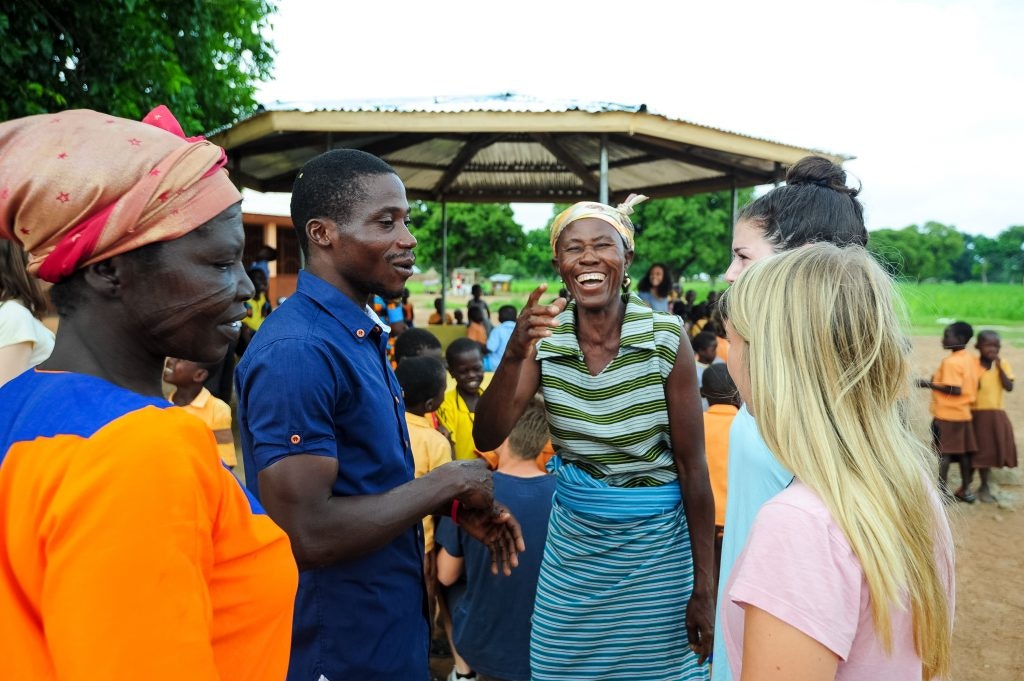
-
Save
Credit: Rustic Pathways
Copyright: © 2016 Rustic Pathways
Usage with express permission only.
Cultural Richness and Ethnic Groups
Ghana is home to 100 distinct groups, with the Akan people constituting the largest ethnic group. Each ethnic group has its own distinct language, but English is the official language of Ghana.
| Ethnic Group | Percentage |
| Akans | 46 |
| Mole-Dagbon | 19 |
| Ewe | 13 |
| Ga-Adangbe | 7 |
| Gurma | 6 |
| Guan | 3 |
| Gurunsi | 3 |
| Mande | 2 |
| Other / Unspecified | 2 |
| Total Ghana | 100 |
Historical Context of the Republic of Ghana
The country was formerly known as the Gold Coast. The name Gold Coast symbolized a region rich in gold, petroleum, sweet crude oil, and natural gas.
Ghana’s Atlantic coastline played a central role in the slave trade, making connections between West Africa and South America which persist until today in music and culture.
Modern Ghana is named after an ancient empire that existed until the 13th century. Led by Kwame Nkrumah, Ghana gained independence from Britain in 1957, becoming the first sub-Saharan nation to break free from colonial rule. Ghana’s independence movement inspired over 30 other African countries to declare their independence.
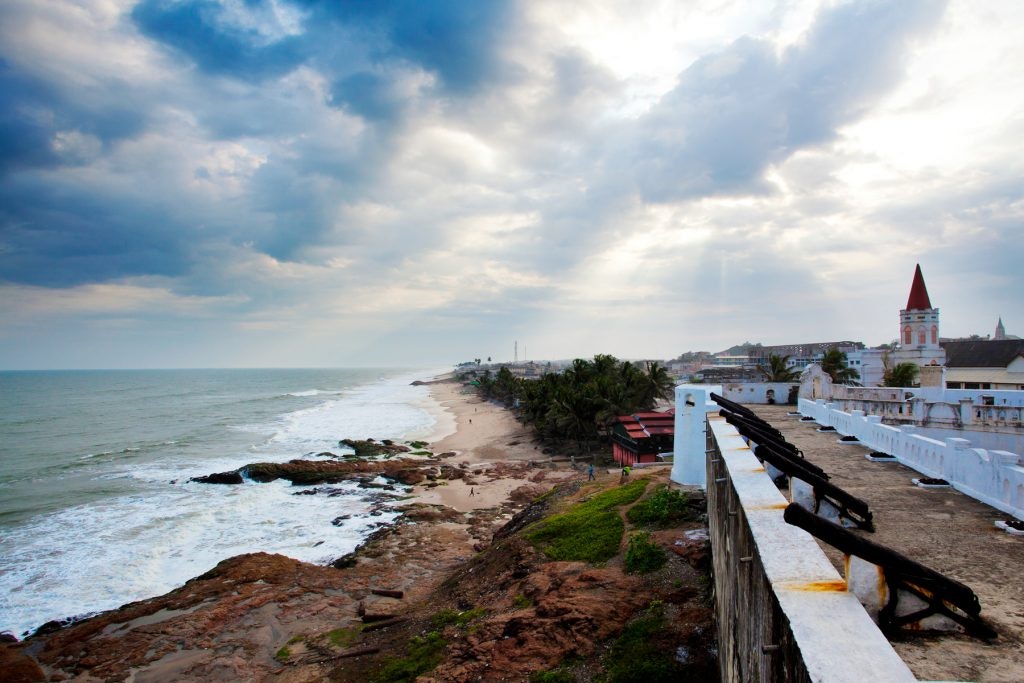
-
Save
Economic Landscape and Natural Resources
Ghana’s economy is shaped by its precious metals like gold, as well as oil, diamonds, manganese, bauxite and iron ore. The country also has phosphate, nickel, chromium and uranium deposits.
Modern Ghana is leaning into tourism and ecotourism, leveraging its coastline, animals and history.
Play on easy mode: Ask Rustic Pathways to plan your tour of Ghana
Frequently Asked Questions
What is the official language of Ghana?
The official language of Ghana is English.
Are there other local languages spoken?
There are 80 local languages spoken. Besides English, Akan is widely spoken.
What are the major ethnic groups in Ghana?
The major ethnic groups in Ghana are the Akan, Mole-Dagbon, Ewe, Ga-Dangme, Gurma, Guan, Grusi, and Mande.
What travel to Ghana vaccines are needed?
Yellow fever vaccine is required for all travelers 9 months or older for travel to Ghana.
What are the emergency contact numbers in Ghana?
The emergency contact numbers in Ghana are 112 for any emergency. For specific services, call 191 for police, 193 for ambulance, and 192 for the fire department.
Why the increase of black travel groups to Ghana in recent years? What is genealogy tourism?
Black travel groups to Ghana have surged with the increase in genealogy tourism, or roots tourism, a trend in the tourism industry where people visit places connected to their ancestors.

